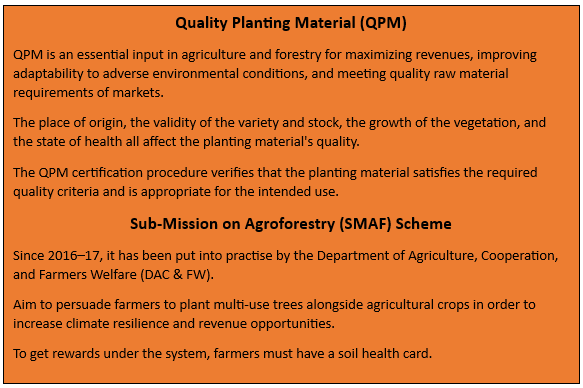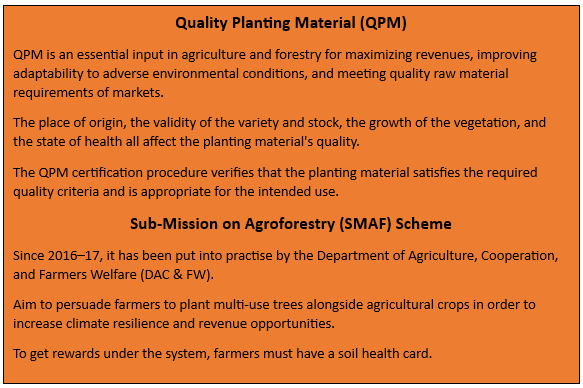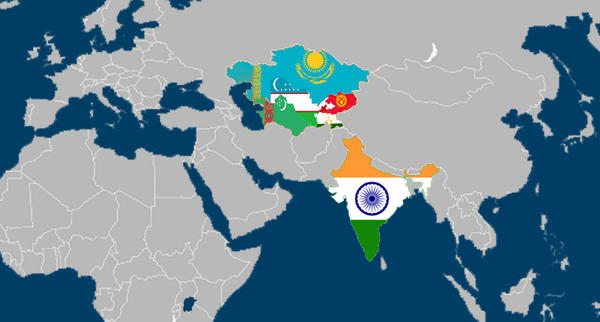- Courses
- GS Full Course 1 Year
- GS Full Course 2 Year
- GS Full Course 3 Year
- GS Full Course Till Selection
- MEP (Mains Enrichment Programme) Data, Facts
- Essay Target – 150+ Marks
- Online Program
- GS Recorded Course
- NCERT- First Ladder
- Polity
- Geography
- Economy
- Ancient, Medieval and Art & Culture AMAC
- Modern India, Post Independence & World History
- Environment
- Governance
- Science & Technology
- International Relations and Internal Security
- Disaster Management
- Ethics
- Current Affairs
- Indian Society and Social Issue
- CSAT
- 5 LAYERED ARJUNA Mentorship
- Public Administration Optional
- ABOUT US
- OUR TOPPERS
- TEST SERIES
- FREE STUDY MATERIAL
- VIDEOS
- CONTACT US
EMPOWERING AGROFORESTRY AND NATURAL FARMING
EMPOWERING AGROFORESTRY AND NATURAL FARMING
11-08-2023

Latest Context
Within the context of the Rashtriya Krishi Vikas Yojana (RKVY), the formerly Centrally Sponsored Scheme of Sub-Mission on Agroforestry (SMAF) has been reorganised and included as an agroforestry component.
This ground-breaking strategy is consistent with India's dedication to environmentally benign practises, including the development of natural farming, a system devoid of chemicals that is based on integrated agriculture and animal husbandry.
Features of Restructured Agroforestry Scheme Under RKVY
- Focused Approach:
- The redesigned programme gives top priority to developing and guaranteeing the supply of Quality Planting Material (QPM), which is an essential component in the field of agroforestry.
- The Central Agroforestry Research Institute (CAFRI), a division of the Indian Council of Agricultural Research, assumes the crucial function of being the nodal organisation for supplying technical support, capacity building, and direction for establishing nurseries, producing, and certifying QPM.
- Under this plan, the development and certification of QPM were given a special priority.
- AICRP Centers: In order to promote innovation, create sustainable practises, and spread knowledge, CAFRI works with research centres all throughout the country as part of the All India Coordinated Research Project (AICRP) centres on agroforestry.
- State Nodal Departments/Agencies: Each State and Union Territory names a State Nodal Department or Agency for efficient implementation. The State Nodal Department/Agency is in charge of making sure that QPM is produced and made available, either on its own or in conjunction with other organisations and institutions.
- Free Distribution to Farmers/SHGs: Farmers and Self-Help Groups (SHGs) have access to the QPM raised through this programme, either for free or at the discretion of the appropriate States/UTs.
- Key Components and Activities:
- Tissue Culture Lab for Quality Planting Material
- Establishment of Nurseries for QPM Production
- Skill Development and Awareness Campaign (up to 5% of allocation).
- Research & Development, Market Linking.
- Project Management Unit (PMU) and Agroforestry Technical Support Group (TSG).
- Local Initiatives (up to 2% of Approved Annual Plan).
Government Initiatives for Promoting Natural Farming
- Bharatiya Prakritik Krishi Paddhati (BPKP) Sub-Scheme: This sub-scheme, which was introduced under the Paramparagat Krishi Vikas Yojana (PKVY) starting in 2019–2020, promotes chemical-free farming through an integrated strategy using livestock and local resources, with a focus on mulching and biomass recycling.
- Namami Gange Program: The government is pushing chemical-free organic gardening along the Ganga River's banks as part of the PKVY programme. Since 2017–18, this effort has covered over 1.23 lakh hectares of land.
- Expansion Along the Ganga Corridor: For a 1.48 lakh acre area along 5-km wide corridors along the Ganga River in the states of Bihar, Jharkhand, Uttarakhand, and Uttar Pradesh in 2022–2023, the government authorised Chemical-free Natural Farming.




